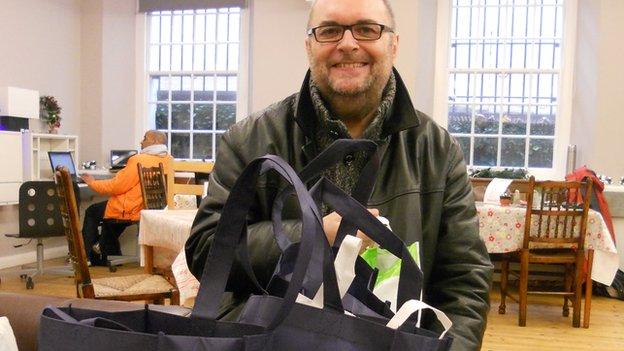'Pay benefits faster' to reduce hunger, MPs urge
- Published
- comments
Rosie Weston: "I can last a week without eating"
An income squeeze, benefit delays and excessive utility bills are blamed by a cross-party group of MPs for a huge rise in the use of food banks.
The inquiry, by Conservative and Labour MPs and Church leaders, says many families are one unexpected bill away from financial crisis.
They urge quicker benefit payments, the extension of free school meals and a living wage to reduce hunger.
Downing Street said it would consider the report "seriously".
But one Conservative peer who served on the inquiry team had to apologise after suggesting hunger in Britain was caused in part by people being unable to cook.
Baroness Jenkin of Kennington later acknowledged her words had been badly chosen.
Lady Jenkin said she had been trying to make the point that home-cooked meals were often cheaper and more nutritious than packaged food.
The all-party parliamentary inquiry into hunger in the UK was set up to understand the extent and spread of hunger, food poverty and to investigate its underlying causes.
The inquiry found the number of food banks run by the charity Trussell Trust had grown from a handful to 420 in the past 10 years. And it heard suggestions there may be at least as many food banks operating independently.
The growth in food bank use is mirrored across Europe and the US, the report said, external.
It acknowledged UK families on low incomes "have been hit disproportionately hard" by rising living costs and this has eroded the value of their income.
"Too many people living in low-income households often face the choice of putting money in the gas meter or food on the table," it said.
The report said: "Benefit-related problems were the single biggest reason given for food bank referrals by almost every food bank that presented evidence to us.
Hunger in the UK
4 million
people at risk of going hungry
272
food banks across big cities and towns
-
500,000 children live in families that can't afford to feed them
-
3.5 million adults cannot afford to eat properly
"The inquiry is concerned that there are avoidable problems occurring in the administration of social security benefits, which have a particularly detrimental impact on poor and vulnerable claimants."
The Department for Work and Pensions measures the average number of days taken between an application and a decision being made on a claim.
"Whilst the department aims for this process to be concluded within 16 days, we heard that for some claimants even this length of time is too long to survive without money," the report said.
The authors want benefits to be delivered within five days of a legitimate claim and for more discretionary payments to be made when delays occur.
A government spokesman said it would examine concerns raised over the late payments of benefits.
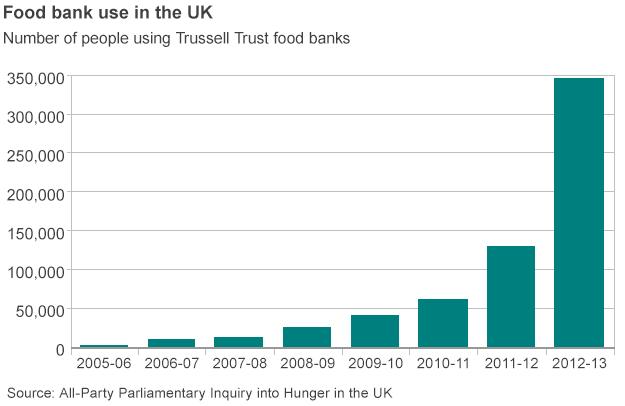
The inquiry team also wants free school meals to be extended to more children of low-income parents.
The MPs also recommend a national organisation be set up to end the destruction of edible food and ensure more of this goes to those who need it.
Robin Aitken, co-founder of the Oxford Food Bank, which passes surplus food from supermarkets to charities, said people had become more aware of food banks and this had contributed to their rise in popularity.
But Prof Liz Dowler, from the University of Warwick, said all the evidence showed food banks were often a last resort.
"They go there because they are desperate," she told the Today programme.
She also dismissed the idea that using surplus food was the solution to hunger in Britain.
"There is no evidence from any country that has systemised using food waste to feed hungry people that it is effective. It is better to reduce it," she said.

Life on the bread-line
The cupboards in the Western family household were almost bare when Paul and Rosie Western visited a food bank in Salisbury with their father, Paul.
All they had left was two cans of beans and a loaf of bread.
Both 19-year-olds have become accustomed to going hungry since their father lost his job in the summer.
"We had no food for two weeks once," said Paul.
Astonishingly, Rosie says she can live without eating: "I've done it for a week before."
But for Paul, it has meant he has collapsed at work.
Their father Paul, 55, says until recently he has worked continuously for 40 years.
But his lack of IT skills and literacy problems have left him struggling to find work and grappling with a demanding benefits system.
"It's difficult to live on what they pay you and all the paper work that's involved.
"There are tens of thousands of people in this situation."

"You are using one thing which is wrong with the food system to address another. Why should poor people have to eat waste left-over food?"
Archbishop Justin Welby: "shocking" to see thousands of people reduced to seeking food handouts
On Sunday, the Archbishop of Canterbury, Justin Welby, backed the report, saying food was being wasted in "astonishing" amounts while hunger "stalks large parts" of the country.
The archbishop said he was more shocked by the plight of the UK's hunger-stricken poor than those suffering in African refugee camps, because it was so unexpected.
Deputy Prime Minister Nick Clegg said benefits sanctions - for infractions such as missing interviews or failing to take part in a work-related activity - were partly to blame and should not always be imposed "overnight".
A government spokesman welcomed the report's recognition that the reasons behind demands for emergency food assistance were "complex".

How does it work?
The Trussell Trust is the largest food bank provider in the UK, with over 420 facilities
Volunteers and staff collect, catalogue and distribute non-perishable food donations from the public
To qualify for a food parcel, recipients must have been issued with a voucher by front-line agencies such as social services, the police or doctors
Each visitor can be referred three times before the food bank asks further questions

"As a country we have enough food to go around, and we agree that it is wrong that anyone should go hungry at the same time as surplus food is going to waste.
"There is a moral argument as well as a sustainability one to ensure we make the best use of resources.
The spokesman said it was important to remember "this country has been through the deepest recession in living memory, and sticking to this government's long-term economic plan is the best way to improve living standards".
He said the plan was working and the economy growing while the welfare system provided a vital safety net.
- Published8 December 2014

- Published8 December 2014
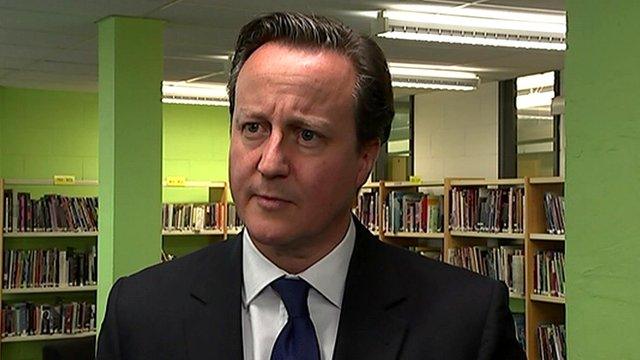
- Published8 December 2014
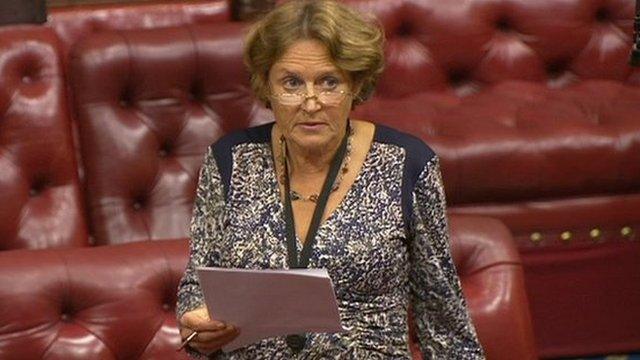
- Published7 December 2014
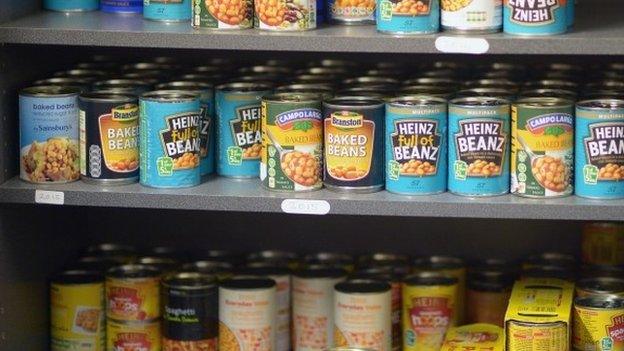
- Published28 November 2014
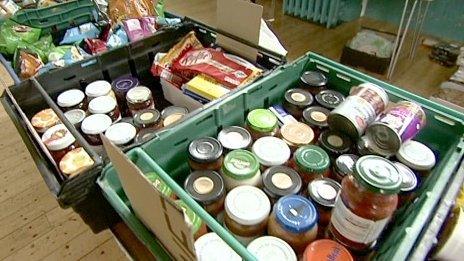
- Published18 December 2013
